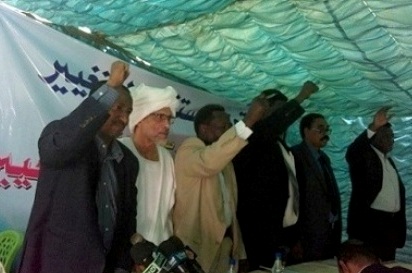Opposition FFC calls to consider Sudan’s dialogue a step towards inclusive process
May 21, 2016 (KHARTOUM) – Sudan’s opposition alliance of the Future Forces of Change (FFC) has expressed optimism that it could reach an agreement with the national dialogue mechanism known as “7+7” on how to deal with the outcome of the dialogue conference.

Last month, FFC and the 7+7 committee held discussions in and agreed to hold a series of meetings to reach joint understanding on peace and dialogue issues.
FFC political secretary and deputy chairman of the Reform Now Movement (RNM) Hassan Rizq said the dialogue conference wasn’t inclusive, saying the major opposition forces such as the National Consensus Forces (NCF), National Umma Party (NUP) and the main armed movements didn’t participate in it.
He told Sudan Tribune that the recent meeting between the FFC and the 7+7 committee didn’t discuss the participation of the FFC in the dialogue conference, saying the two sides discussed ways for holding a comprehensive dialogue to address the root causes of the Sudanese crisis.
He pointed that the FFC sees that the outcome of the dialogue conference must be dealt with as a step towards the inclusive dialogue, saying the holdout opposition should develop their own proposals and then the two sides could reach joint recommendations.
Rizq expected that the coming meetings between the FFC and the 7+7 committee would be fruitful; saying the first meeting between the two sides was held upon an invitation from the African mediation chief Thabo Mbeke and the second meeting sought to develop an agenda to discuss ways for holding a comprehensive dialogue
“We are optimistic and we think those meeting would produce something … We [FFC] are accepted by both parties, the participants and the holdout groups” he said
He pointed that the FFC managed to bridge the gap between Mbeki and the NUP leader al-Sadiq al-Mahdi, saying they also held meetings with the Beja Congress, Liberation and Justice Party, Popular Congress Party (PCP) and the national figures signatories of the memorandum which was submitted to the presidency.
“We want all holdout groups to participate [in the dialogue] and this wouldn’t occur unless we resolve all problems including the demands by armed groups such as unifying negotiations tracks and offering the necessary guarantees for movement and travel [of rebel leaders to Sudan],” he said
“We want to create a conducive climate for holding the dialogue by allowing freedoms and lifting the extraordinary measures applied on the press and stopping the detention of students,” Rizq added
Rizq stressed the need to reach a consensus on how to hold the comprehensive national dialogue, saying “the government says what has taken place is the national dialogue while the African Union calls for holding a comprehensive dialogue”.
Following a three day-meeting with a government delegation in the Ethiopian capital last March, three armed groups in Darfur and the Two Areas and the opposition NUP refused to ink the declaration of principles saying it recognizes a government controlled process as a basis for the national dialogue.
However, Mbeki slammed the position of the opposition groups saying they refused to sign it only because of the venue of the dialogue meeting.
He added that some opposition groups including the FFC accepted to meet the dialogue body to discuss the confidence building measures for an inclusive national dialogue.
FFC, which was launched last February, is actually formed of three existing coalitions that for different reasons failed to join the NCF, or the “Sudan Call” forces.
The FFC groups are National Forces Alliance (NFA), National Forces of Change (NFC) and National Unity Parties (NUPs). Some members of these groups, like RNM and Just Peace Forum (JPF), were part of the national dialogue process.
(ST)
